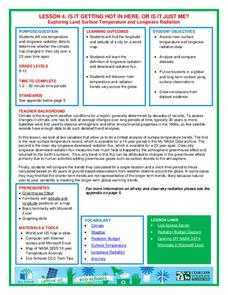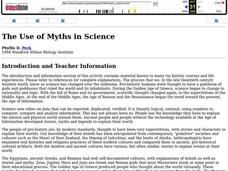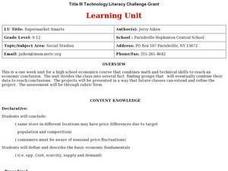National Wildlife Federation
Is It Getting Hot in Here, or Is It Just Me?
Currently, only 2.1% of global warming is felt on continents, while over 93% is felt in the oceans. The fourth lesson in the series of 21 on global warming is composed of three activities that build off one another. In the first...
Curated OER
Extraordinary Extrapolation
Students study how scientists have estimated the maximum height to which trees can grow, and assess the reliability of interpolation and extrapolation techniques by making predictions with particular data sets and analyzing accuracy of...
Curated OER
Climographs
Students identify trends and characteristics of climate zones and specific places within. Then, they graph annual climate trends (primarily Temperature and Precipitation) and create, interpret and extrapolate information based on...
Curated OER
Survey Project
Eighth graders create a website using FrontPage. They use inserted forms to collect survey information and use Microsoft Excel and MS Word to create a presentation of the survey and the results.
Curated OER
What Can We Learn from Primary-Source Documents? Lesson 2
Students extrapolate information from primary-source documents. They read and research to create a whole-class timeline of events leading up to 1867 and Confederation.
Curated OER
Vampires: Fact or Fiction?
Learners predict how many vampires are in the world, based on the legend that, once bitten, each victim becomes a vampire. Extrapolating how many vampires would populate the earth in 30+ weeks, students then compare the total predicted...
Curated OER
Working to Overcome Stereotyping
High schoolers design and conduct a survey to develop an understanding of the challenges inherent in changing attitudes and overcoming stereotypes about the Muslim religion and culture. They create multimedia presentations of the findings.
Curated OER
The Use of Myths in Science
High schoolers are told stories, myths and legend to explain their world. After telling the tales and discussion them, students are assigned to write a myth that describes a familiar situation, such as why the school garbage cans are...
Curated OER
The Use of Myths in Science
Learners examine folk tales to determine the basis for scientific myths. They demonstrate through the discussion of the folk tales that the perception of the world has changed as new information is gained. They write their own folk...
Curated OER
Dating Sedimentary Strata
Students investigate how the age of sedimentary strata is determined. In this sedimentary strata lesson, students work through problems that show that geological history covers millions of years. They distinguish between relative and...
Curated OER
Supermarket Smarts
Students examine how a consumer can make informed choices. They visit stores with a prepared shopping list, record the prices on a spreadsheet, create graphs, and create a Powerpoint presentation comparing the total cost of stores and a...
Curated OER
Rwanda: You Go, Girls
Students examine the genocide that took place in Rwanda in 1994 and focus the post-genocide success of women. They study websites to examine how women are challenging their traditional roles in Rwandan society.
Curated OER
Tree Search
Fifth graders plan and conduct investigations to identify and record tree species. They complete Forest Plotter and write about tree species found and draw pictures of them.
Curated OER
The Senate : Retention, Abolition, Reform
Students examine the strengths and weaknesses of the Senate in the Canadian Parliament. The role of the Senate is probed as its usefulness is scrutinized.














